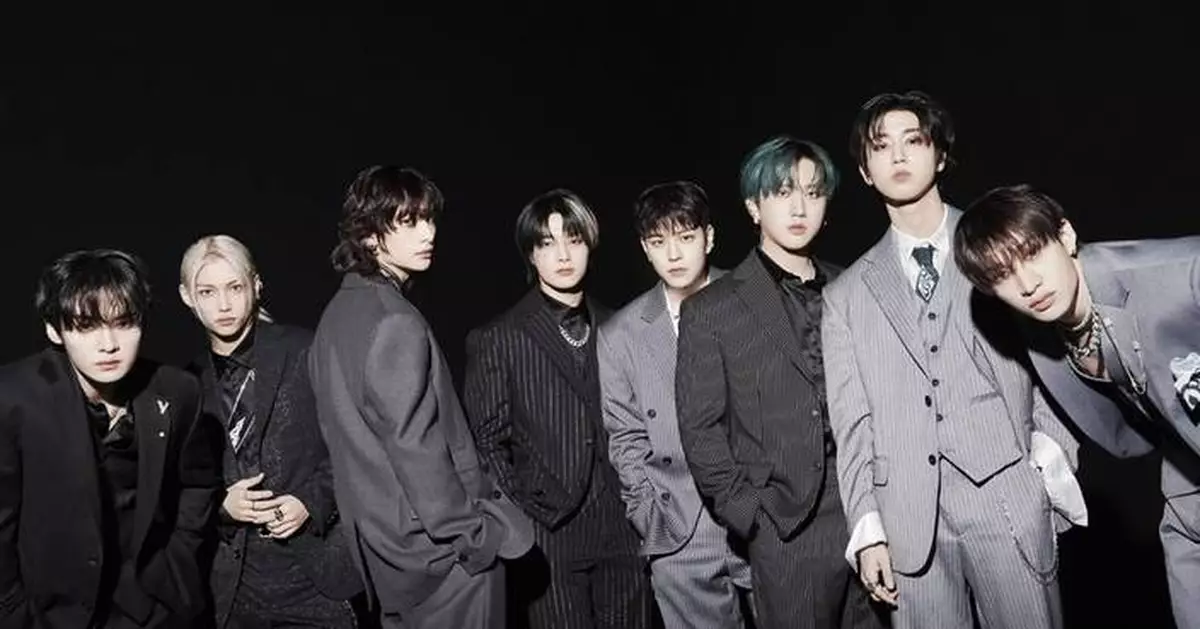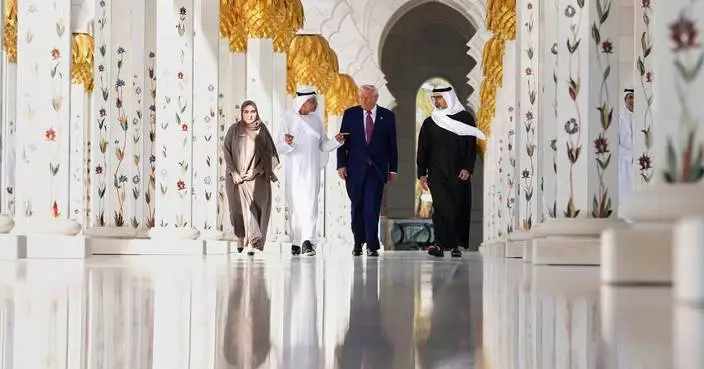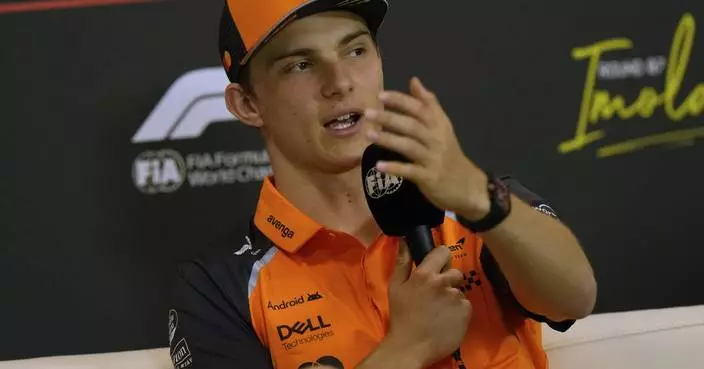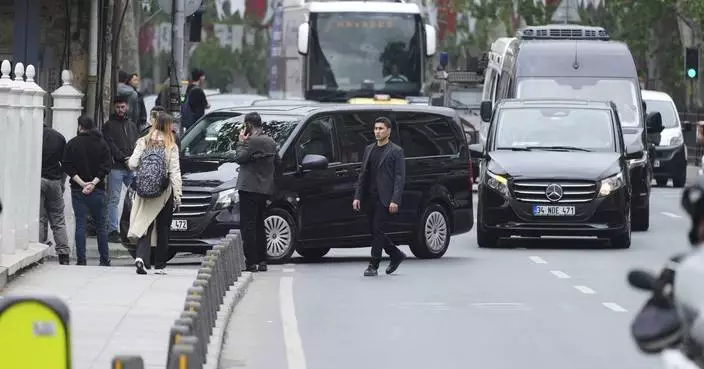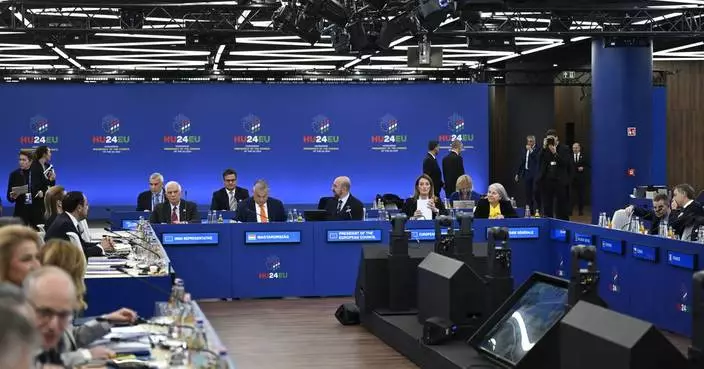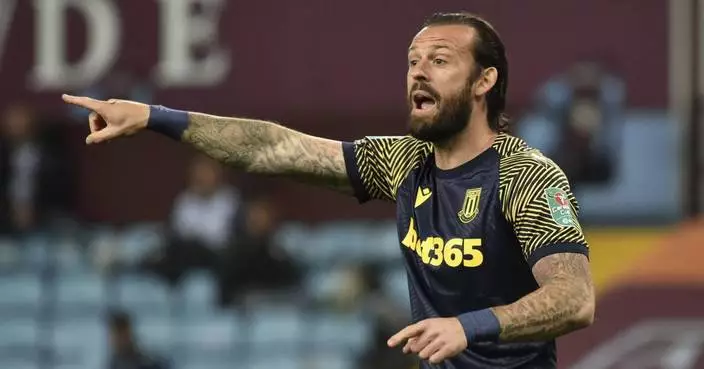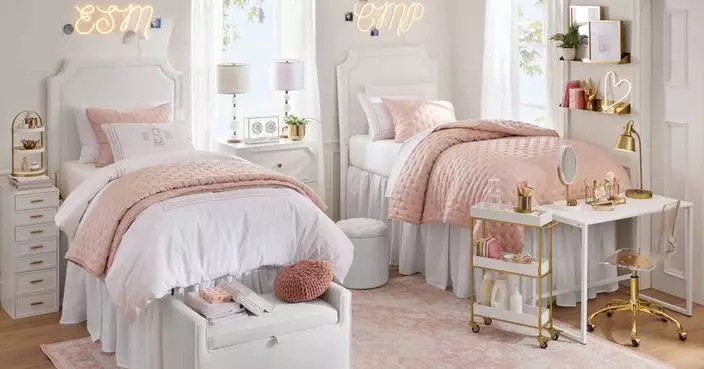TOKYO--(BUSINESS WIRE)--Feb 12, 2025--
Bioré UV, the top-selling suncare brand in Japan *1 and a globally acclaimed name from Kao Corporation (TOKYO:4452), is excited to announce its partnership with Stray Kids, one of the most celebrated K-pop groups, for its latest global campaign. This collaboration aims to encourage people to enjoy activities under the sun, empowered by high-performing, lightweight UV protection formulated for everyday use.
This press release features multimedia. View the full release here: https://www.businesswire.com/news/home/20250212472016/en/
The "SUNLIGHT IS YOUR SPOTLIGHT." campaign will kick-off in April 2025 in more than 15 countries and regions *2, showcasing a dynamic blend of visuals, videos. Prior to the launch of the campaign, a video message from the members is now available.
*1 Intage SRI+® (Nationwide Retail Store Panel Survey) sunscreen market, cumulative sales from September 2020 to August 2024 in Japan.
*2 Number of countries and regions as of February 2025. Subject to change.
Message from Stray Kids
Video Message (YouTube)
Stray Kids is recognized for their unique musical creativity and global influence, boasting an impressive 31 million followers on Instagram. This collaboration aims to inspire a global audience, expanding its reach beyond the Asian market to the U.S. and U.K.
As a prominent brand in sun protection, Bioré UV plays a key role in Kao's Global Sharp Top Strategy. This strategy aims to establish leadership in important market segments by providing high-value products. While supporting Kao's growth objectives, Bioré UV is committed to driving innovation in sun protection and reaching a broader consumer base worldwide.
"We are thrilled to welcome Stray Kids as the faces of our new suncare campaign," says Mitsutoshi Kamiya, Vice President of Health Beauty Care - Asia (Int’l) Business at Kao Corporation. "Their global appeal, passion, and drive for excellence align with our values at Bioré UV. Stray Kids has overcome numerous challenges in the competitive music industry, stepping into the spotlight and continuing to shine on a global stage.”
"By emphasizing the benefits of proper sun care," Kamiya continues, " Bioré UV empowers individuals who are concerned about sun exposure to confidently enjoy the outdoors. We believe that Stray Kids truly embodies the phrase 'Sunlight is your spotlight.' Together, we strive to inspire people everywhere to prioritize effective UV protection and enjoy the sun with confidence."
Bioré UV offers an innovative range of lightweight sunscreens that provide long-lasting UV protection and hydrating formulas. These products cater to various lifestyles and skin needs. This global campaign will roll out across Bioré UV ’s official social media channels and select retail locations worldwide.
Campaign Overview
About Stray Kids
Stray Kids is a South Korean K-pop group formed by JYP Entertainment in 2017 through a reality survival show of the same name. They are heavily involved in self-producing their music and writing their own lyrics. In 2024, their album “ATE” set a record as the best-selling K-pop album in the U.S. Their December album, ' SKZHOP HIPTAPE “HOP”,' secured a historic six consecutive No. 1 on the Billboard 200, making Stray Kids the first act to debut top of the chart with their first six chart entries. Stray Kids was also recognized as the 2000s' top-charting artists on the Billboard 200. They are currently on their most extensive world tour to date, "Stray Kids World Tour <dominATE>". Their popularity extends beyond South Korea and Japan, reaching a global audience, including the United States.
About Bioré UV
Bioré UV, developed in 1996 by Kao Corporation, is Japan's leading suncare brand and a global innovator in sun protection. Known for its lightweight and hydrating formulas, Bioré UV provides long-lasting UV protection with an SPF of 50+. The brand combines effectiveness with everyday usability, offering reliable protection in a formula that is suitable for daily use. This allows users to enjoy the sun safely with confidence. Bioré UV has been the number one brand in Japan’s domestic sunscreen market for four consecutive years. Globally, the brand offers products in 27 countries and regions, striving to create a world where everyone can enjoy the sun with a healthy smile”.
About Kao
Kao, a Japan-based manufacturer of personal care and household products, cosmetics, and specialty chemicals creates high-value-added products and services that provide care and enrichment for the life of all people and the planet. Through its brands such as Attack laundry detergent, Bioré and Jergens skin care products, Laurier sanitary products, Curél, SENSAI, and MOLTON BROWN cosmetics, and Oribe hair care products, Kao is part of the everyday lives of people across Asia, the Americas, Europe, the Middle East, and Africa. Combined with its chemical business, which contributes to a wide range of industries, Kao generates about 1,530 billion yen in annual sales. Kao employs about 34,300 people worldwide and has more than 130 years of history in innovation. As an enterprise that provides products people use on a daily basis, the Kao Group takes responsibility to actively reduce the environmental footprint of its products throughout the product lifecycle. This is laid out in Kao’s ESG strategy, the Kirei Lifestyle Plan, which launched in 2019.
Please visit the Kao Group website for additional information.
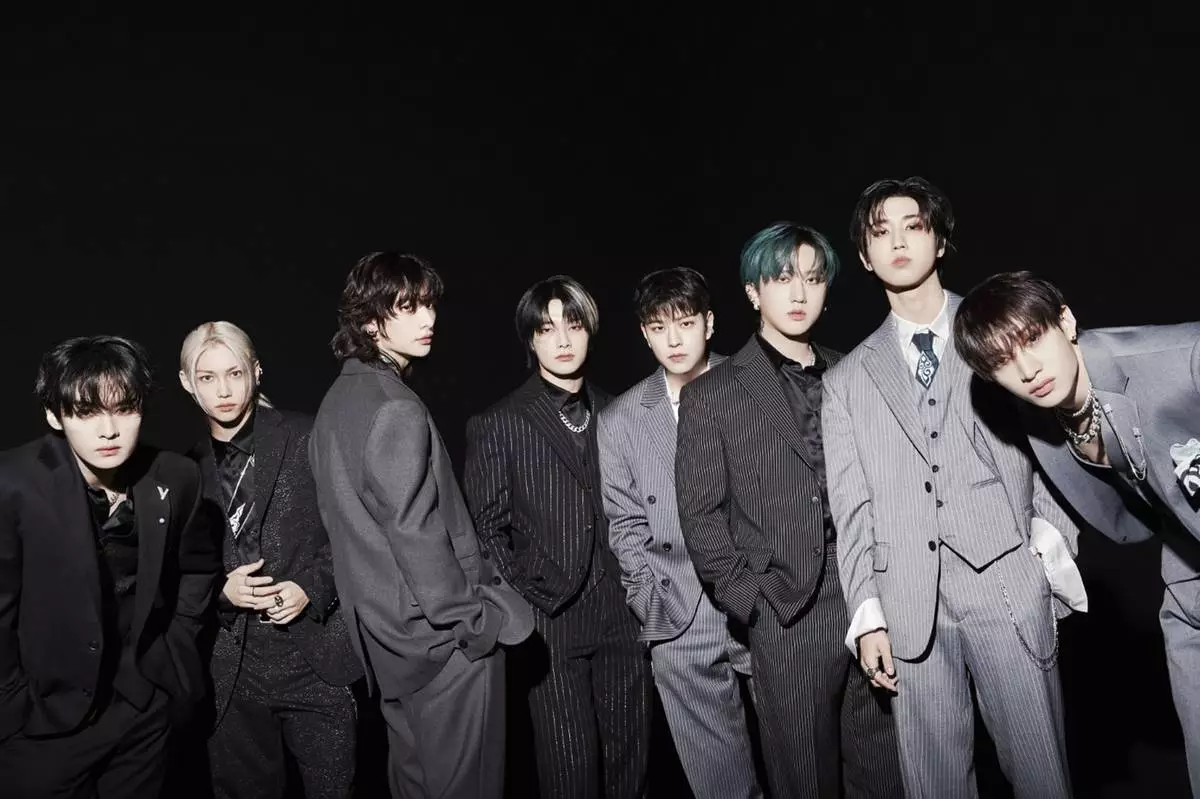

Stray Kids (Photo: Business Wire)
ABU DHABI, United Arab Emirates (AP) — President Donald Trump used the first major foreign trip of his second term to outline a vision for restoring global stability that is grounded in pragmatism and self-interest rather than values, holding out U.S. ties to wealthy Gulf countries as a model for America’s longtime foes.
His four-day swing through Saudi Arabia, Qatar and the United Arab Emirates, which ends Friday, put a spotlight on Trump’s transactional approach to foreign affairs as he was feted by autocratic rulers with a trio of lavish state visits where there was heavy emphasis on economic and security partnerships.
His trip played out against the backdrop of stubborn global conflicts, including Gaza and Ukraine, that showed the limits of his influence. But Trump insisted he was turning the page on American “interventionalism” in the region as he moved to recognize the new government in Syria for the first time and prodded Iran to engage on nuclear talks before it’s too late.
Some takeaways from Trump’s travels:
Presidential trips to the Middle East usually feature at least some public calls for authoritarian governments to improve their human rights efforts. Not this one, as Trump celebrated his business deals with Gulf royals and admired their wealth.
Trump toured the marble and gilded palaces of Gulf rulers and deemed them “perfecto” and “very hard to buy.” He praised the “gleaming marvels” of the skyline in Saudi Arabia. And he groused about the “much less impressive” Air Force One.
In Trump’s remarks at a VIP business conference in Riyadh, he went out of his way to distance himself from the actions of past administrations, the days when he said American officials would fly in “in beautiful planes, giving you lectures on how to live and how to govern your own affairs.”
Rights advocates took that as a pledge of nonintervention, swearing off some of the pressure past U.S. presidents have brought to bear on partners to varying degrees to ease up on detentions, suppression of critics and other issues.
“It’s absolute support for absolute monarchy,” said Saudi exile Abdullah Alaoudh. His father, a Saudi cleric with a wide following there, is imprisoned in the kingdom.
Some rights advocates said Trump officials gave them private assurances the administration was working on behalf of detained Americans and rights advocates. Tommy Pigott, a deputy spokesman at the State Department, declined to say whether Trump raised those or other rights issues in discussions with Gulf royals.
While Trump was in the Mideast, Vladimir Putin opted to skip direct peace talks with Ukraine’s Volodymyr Zelenskyy despite the U.S. president's strong calls for them to meet face to face.
Trump has been pushing Putin and Zelenskyy to move with greater haste to end Russia's grinding war in Ukraine.
But after it became clear Putin wouldn’t be attending talks in Turkey this week and would instead be sending underlings to Istanbul, an annoyed Trump insisted he knew all along that it was highly likely Putin would be a no-show.
“I don’t believe anything’s going to happen whether you like it or not, until he and I get together,” Trump said. “But we’re going to have to get it solved because too many people are dying."
As he wrapped up his visit on Friday, Trump said the face-to-face would happen "as soon as we can set it up.”
Trump was scheduled to fly back to Washington on Friday, but tried to keep people guessing until the end. He teased late Thursday that he would be heading to a “destination unknown” — “probably" Washington, he added. His opaque language stoked speculation that he might make a drop-by to Turkey.
But on Friday morning, he told reporters he needed to get back to Washington. His daughter Tiffany had her first child while the president has been away.
“I would actually leave here and go,” Trump said. “I do want to see my beautiful grandson.”
Just two months ago, the Trump administration wasn’t sold on Syria’s interim government led by Ahmad al-Sharaa, the onetime al-Qaida-affiliated insurgent. They worried the Syrian president didn’t have the legitimacy to govern the country’s ethnically diverse population.
Clashes broke out in early March, killing hundreds and targeting many more members of the Alawite religious minority to which the ousted Syrian leader Basher Assad belongs.
The moment gave the Trump White House pause about easing sanctions on Syria. But Trump signaled Monday that he was having a change of heart and was moving toward lifting the Syria sanctions. A day later, he announced the move during an address to Gulf leaders.
Trump then took it another step by agreeing to meet al-Sharaa.
Trump said he was impressed with al-Sharaa, who not that long ago had a $10 million U.S. bounty on his head. The president called him a “young, attractive guy” with a "very strong past.”
Trump said it was recommendations from Turkish President Recep Tayyip Erdogan and Saudi Crown Prince Mohammed bin Salman that nudged him to take a chance on al-Sharra.
“President Erdogan called me and said: ‘Is there any way you could do that? Because if you don’t do that, they don’t have a chance,’” Trump said. “So, I did it.”
Throughout the trip, Trump felt more than comfortable dishing out exaggeration and hyperbole.
“This has been an amazing trip.” Trump told reporters Thursday as Air Force One was about to land in Qatar. “We’ve raised trillions of dollars of investment for our country.” A little later he put the figure at $4 trillion.
That figure is about two times the combined gross domestic products of Saudi Arabia, Qatar and the United Arab Emirates, meaning that any announced investments would likely accrue over several years — if at all — in ways that might not show up in overall U.S. economic growth numbers.
Boeing confirmed that Qatar’s $96 billion purchase of its 787 and 777X jets was the largest order for 787s and wide body jets in the company’s history. Trump enthused it was “the biggest order in the history of, I think, aviation, certainly of that size” of jets.
Trump also went overboard in running down the economic record of his predecessor, Democrat Joe Biden, at one point declaring, “The days of economic misery under the last administration are rapidly giving way to the greatest economy in the history of the world.”
The U.S. economy grew at 2.8% last year. It declined at an annualized rate of 0.3% during the first three months of this year.
While Trump's trip initially was conceived as a visit to reward countries that invest in the United States, Trump at one point hoped it also would herald significant steps to end the wars in Gaza and Ukraine. Positive news on both fronts proved elusive.
Trump barely mentioned either conflict on his trip – and when he did, it was generally in the context of his assertion that they wouldn’t have occurred had he won reelection in 2020.
As Israel stepped up an offensive in Gaza — a prelude to a promised full takeover of the territory if Hamas doesn’t release the remaining hostages in its captivity — Trump was again musing about the creation of a “freedom zone” in its territory. It's a notion rejected by Palestinians and the broader Arab world because Trump's plan would relocate civilians from Gaza to allow for rebuilding.
Israel conducted significant airstrikes all week in Gaza as Trump was in the region and the fighting on the ground appeared to escalate Friday morning even before Trump left the UAE.
Trump was already facing questions about conflicts of interest for traveling to the Middle East to shape U.S. policy at a time when his family’s business interests in the region have boomed. He attempted to quiet worries about national security and constitutional questions by insisting he’s smart to accept a $400 million luxury plane from Qatar and use it as Air Force One.
“Why should our military, and therefore our taxpayers, be forced to pay hundreds of millions of Dollars when they can get it for FREE,” Trump posted on his social media site during his Middle East swing.
The president also dodged questions about a state-backed investment company in Abu Dhabi using a Trump family-aligned stablecoin for a $2 billion investment in the world’s largest cryptocurrency exchange.
“I don’t know anything about it,” he said.
Beyond that, the Trump family has piled up deals to license its brand for real estate projects, and to build Trump towers and golf courses, around the Middle East. White House press secretary Karoline Leavitt says it’s “frankly ridiculous” to wonder if those profits might influence Trump’s governing decisions.
Madhani reported from Dubai. Associated Press writers Josh Boak, Will Weissert and Ellen Knickmeyer in Washington contributed to this report.
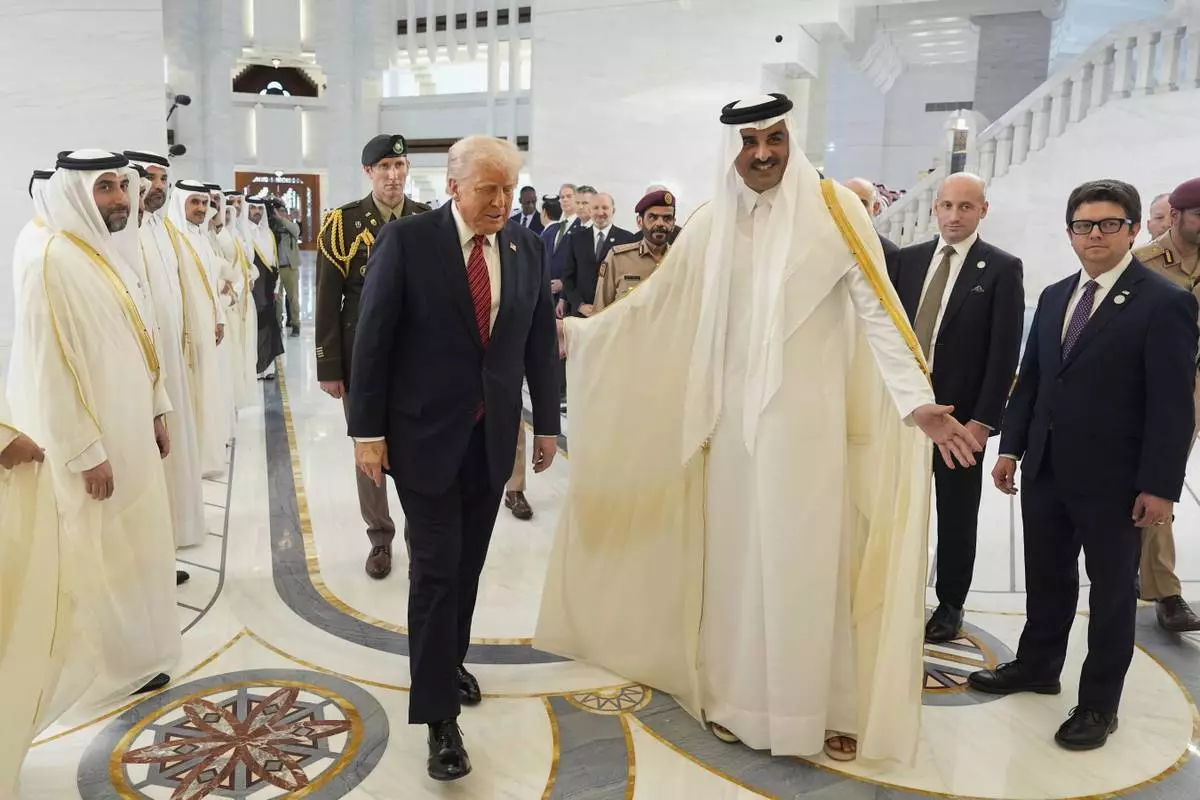
Qatar's Emir Sheikh Tamim bin Hamad Al Thani welcomes President Donald Trump during an official welcoming ceremony at the Amiri Diwan in Doha, Qatar, Wednesday, May 14, 2025. (AP Photo/Alex Brandon)
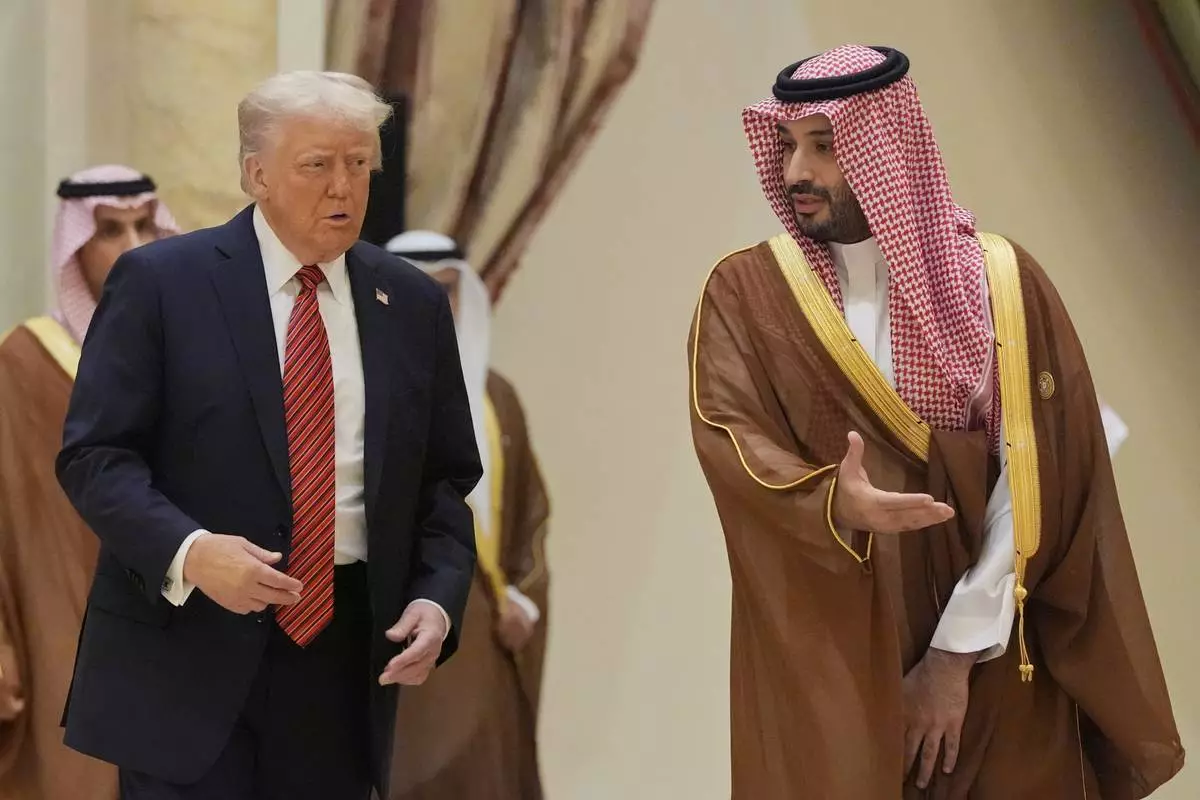
President Donald Trump arrives with Saudi Crown Prince Mohammed bin Salman for the group photo with Gulf Cooperation Council leaders during the GCC Summit in Riyadh, Saudi Arabia, Wednesday, May 14, 2025. (AP Photo/Alex Brandon)
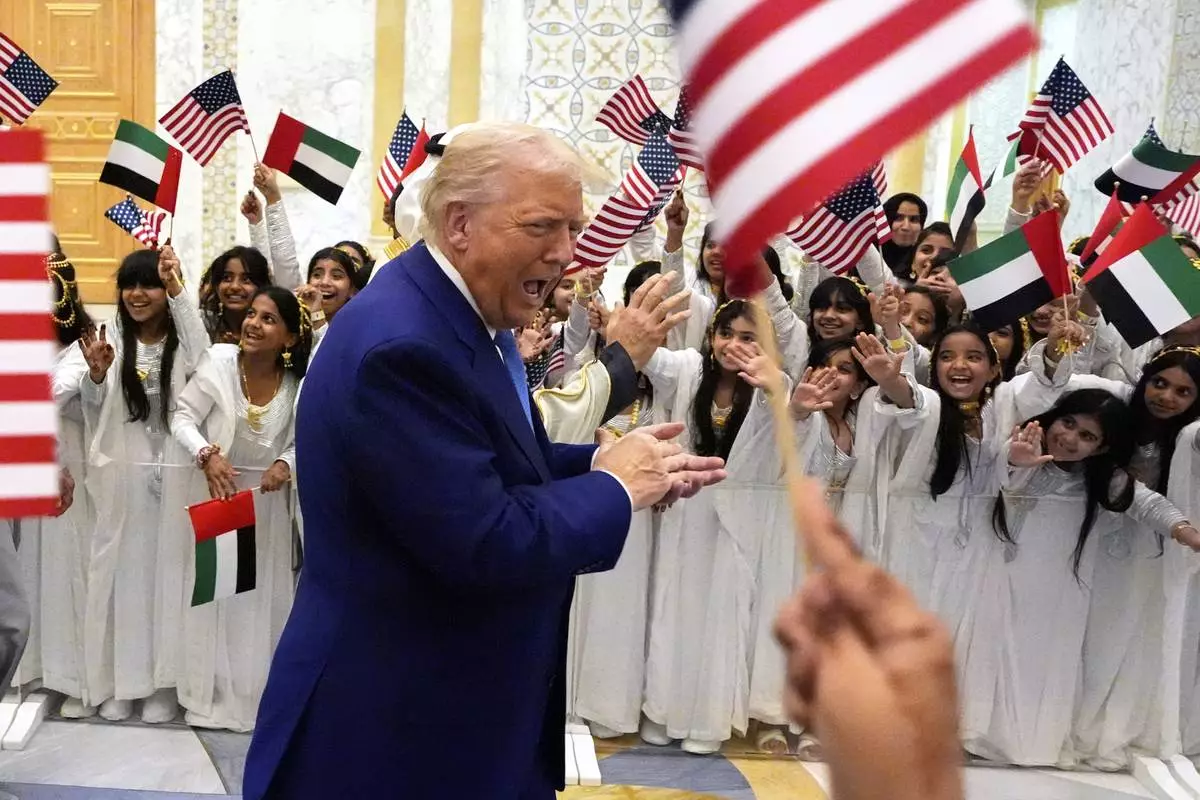
President Donald Trump and UAE President Mohammed bin Zayed Al Nahyan arrive at Qasr Al Watan, Thursday, May 15, 2025, in Abu Dhabi, United Arab Emirates. (AP Photo/Alex Brandon)




